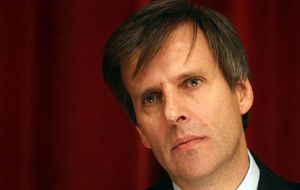MercoPress. South Atlantic News Agency
Argentine chief banker resigns but foreign reserves remain frozen
 (Former) Central Bank president Perez Redrado during the press conference
(Former) Central Bank president Perez Redrado during the press conference Argentina's embattled central bank chief, Martin Perez Redrado, resigned Friday amid a bitter dispute with President Cristina Kirchner over control of the bank’s foreign currency reserves.
“I feel that my term at the head of the Central Bank has concluded and I have decided definitively to leave the office of president of the Central Bank, satisfied with the duties I have performed” Perez Redrado told reporters.
The Central Bank president clashed with Mrs. Kirchner as she sought to set aside 6.5 billion dollars in the bank’s foreign currency reserves to pay government bonds maturing this year, a move she described as necessary to shore up Argentina's standing in international markets. Argentine Central Bank reserves total 48 billion USD.
The announcement came while a congressional commission was still deliberating over whether Mr. Perez Redrado had acted properly in refusing to transfer the 6.5 billion USD in reserves into a Bicentennial Fund established by President Cristina Kirchner.
The commission's recommendation was nonbinding, and because President Kirchner had already decided Mr. Perez Redrado should go, he decided to leave on his own terms.
Perez Redrado had said paying down the debt from Argentina's reserves could lead creditors who lost money during the country's massive 2001 loan default laying claim to the reserves. He harshly criticized the government Friday, accusing Kirchner of “permanently trampling institutions” and trying to use “the savings of all Argentines.”
The dispute between the pair had verged on a full-blown crisis, after the Argentine leader issued a decree firing the bank’s governor. He refused to leave and a federal court blocked his dismissal January 7, saying Mrs. Kirchner had failed to obtain congressional approval.
For its part, the government shrugged off Perez Redrado's announcement, insisting that a sacked employee has no post from which to resign. “For us, there is no resignation,” said cabinet chief Anibal Fernandez, who stressed that a new decree will finalize Perez Redrado's sacking.
He had initially refused to testify before the panel unless Kirchner revoked her order removing him from office, but reversed that position and hinted he might resign after addressing the committee.
Argentina is trying to return to voluntary money markets from which she has been barred since the 2001 default, but Perez Redrado's opposition to using reserves to pay off maturing debt received support from counterparts around the world, including European Central Bank president Jean-Claude Trichet
While Perez Redrado's departure removes a hurdle, the Argentine government faces another obstacle in unlocking the reserves. An Argentine court determined that Mrs. Kirchner needed the approval of the full Congress to use the reserves. Lawmakers are expected to take the matter up in March, when they return from summer recess—if they aren't called into an emergency session before then.




Top Comments
Disclaimer & comment rulesCommenting for this story is now closed.
If you have a Facebook account, become a fan and comment on our Facebook Page!